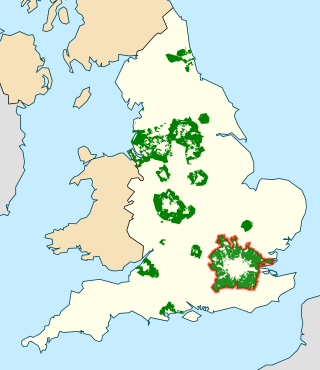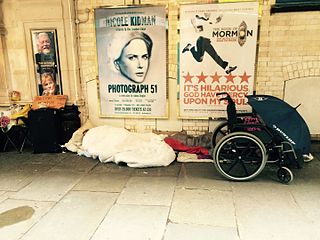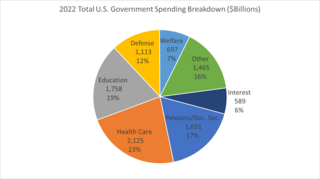Related Research Articles

In British town planning, the green belt is a policy for controlling urban growth. The term, coined by Octavia Hill in 1875, refers to a ring of countryside where urbanisation will be resisted for the foreseeable future, maintaining an area where local food growing, forestry and outdoor leisure can be expected to prevail. The fundamental aim of green belt policy is to prevent urban sprawl by keeping land permanently green, and consequently the most important attribute of green belts is their openness.

An FHA insured loan is a US Federal Housing Administration mortgage insurance backed mortgage loan that is provided by an FHA-approved lender. FHA mortgage insurance protects lenders against losses. They have historically allowed lower-income Americans to borrow money to purchase a home that they would not otherwise be able to afford. Because this type of loan is more geared towards new house owners than real estate investors, FHA loans are different from conventional loans in the sense that the house must be owner-occupant for at least a year. Since loans with lower down-payments usually involve more risk to the lender, the home-buyer must pay a two-part mortgage insurance that involves a one-time bulk payment and a monthly payment to compensate for the increased risk. Frequently, individuals "refinance" or replace their FHA loan to remove their monthly mortgage insurance premium. Removing mortgage insurance premium by paying down the loan has become more difficult with FHA loans as of 2013.

Harold Wilson was appointed Prime Minister of the United Kingdom by Queen Elizabeth II on 16 October 1964 and formed the first Wilson ministry, a Labour government, which held office with a thin majority between 1964 and 1966. In an attempt to gain a workable majority in the House of Commons, Wilson called a new election for 31 March 1966, after which he formed the second Wilson ministry, a government which held office for four years until 1970.
Housing Benefit is a means-tested social security benefit in the United Kingdom that is intended to help meet housing costs for rented accommodation. It is the second biggest item in the Department for Work and Pensions' budget after the state pension, totalling £23.8 billion in 2013–14.
Regional spatial strategies (RSS) provided regional level planning frameworks for the regions of England outside London. They were introduced in 2004. Their revocation was announced by the new Conservative/Liberal Democrat government on 6 July 2010.
Best Value was government policy in the United Kingdom affecting the provision of public services in England. In Wales, Best Value is known as the Wales Programme for Improvement. A statutory duty of Best Value also applies in Scotland.

Business rates in England, or non-domestic rates, are a tax on the occupation of non-domestic property. Rates are a property tax with ancient roots that was formerly used to fund local services that was formalised with the Vagabonds Act 1572 and superseded by the Poor Relief Act 1601. The Local Government Finance Act 1988 introduced business rates in England and Wales from 1990, repealing its immediate predecessor, the General Rate Act 1967. The act also introduced business rates in Scotland but as an amendment to the existing system, which had evolved separately to that in the rest of Great Britain. Since the establishment in 1997 of a Welsh Assembly able to pass legislation, the English and Welsh systems have been able to diverge. In 2015, business rates for Wales were devolved.
The National Federation of Builders (NFB) is a United Kingdom trade association representing the interests of regional contractors and small and medium sized house builders (up to 250 homes per annum) in England and Wales.

The Housing Grants, Construction and Regeneration Act 1996 is an Act of Parliament of the United Kingdom. Its long title shows that it is a piece of omnibus legislation:

Homelessness in the United Kingdom is measured and responded to in differing ways in England, Scotland, Wales and Northern Ireland, but affects people living in every part of the UK's constituent countries. Most homeless people have at least a modicum of shelter but without any security of tenure. Unsheltered people, "rough sleepers", are a small minority of homeless people.

In India, the Urban Local Bodies (ULBs), also called municipalities, are self-government institutions responsible for the administration of cities, towns, and transitional areas within a state or Union Territory. The 74th amendment to the Constitution of India in 1992 provided constitutional framework for the establishment of Urban Local Bodies.
No Secrets, also known coequally as Adult Safeguarding, was a UK Government publication from the Department of Health which provided guidance on developing and implementing multi-agency policies and procedures to protect adults deemed "at risk" from harm and/or abuse. Its full title was "No secrets: guidance on developing and implementing multi-agency policies and procedures to protect vulnerable adults from abuse". It has now been replaced by statutory guidance issued under the Care Act 2014.

The Localism Act 2011 is an Act of Parliament that changes the powers of local government in England. The aim of the act is to facilitate the devolution of decision-making powers from central government control to individuals and communities. The measures affected by the Act include an increase in the number of elected mayors, referendums and the "Local authority’s general power of competence" which states "A local authority has power to do anything that individuals generally may do".
The Social Fund in the UK was a form of welfare benefit provision payable for exceptional or intermittent needs, in addition to regular payments such as Jobseeker's Allowance or Income Support.

The Welfare Reform Act 2012 is an Act of Parliament in the United Kingdom which makes changes to the rules concerning a number of benefits offered within the British social security system. It was enacted by the Parliament of the United Kingdom on 8 March 2012.
The bedroom tax is a United Kingdom welfare policy whereby tenants living in public housing with rooms deemed "spare" experience a reduction in Housing Benefit, resulting in them being obliged to fund this reduction from their incomes, move home, or face rent arrears and potential eviction by their landlord. The policy was introduced as part of the Welfare Reform Act 2012 passed during the Premiership of David Cameron. Bedroom tax is the most commonly used term for the policy, especially by critics of the changes who argue that they amount to a tax because of the lack of social housing for affected tenants to downsize to. The bedroom tax is also referred to as the under-occupancy penalty, under occupation penalty, under-occupancy charge,under-occupation charge or size criteria.
The Costa–Hawkins Rental Housing Act ("Costa–Hawkins") is a California state law enacted in 1995, placing limits on municipal rent control ordinances. Costa–Hawkins preempts the field in two major ways. First, it prohibits cities from establishing rent control over certain kinds of residential units, such as single-family dwellings, condominiums, and newly constructed apartment units. Second, it prohibits "vacancy control", also called "strict" rent control. The legislation was sponsored by Democratic Senator Jim Costa and Republican Assemblymember Phil Hawkins.
Disabled Facilities Grants are paid under the Housing Grants, Construction and Regeneration Act 1996 for the provision of grant aided adaptations for disabled persons' properties within the UK. From 2020/21 the budget was increased to £573 million.

Government spending in the United States is the spending of the federal government of the United States and the spending of its state and local governments.
Homes for Ukraine is a British government scheme started in 2022, which allows households in the UK to provide accommodation for Ukrainian refugees displaced by the Russian invasion of Ukraine.
References
- ↑ Shelter: Discretionary housing payments (DHP) (Accessed 30 Aug 2019)